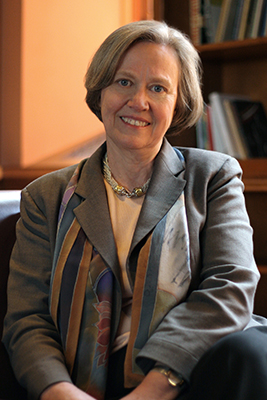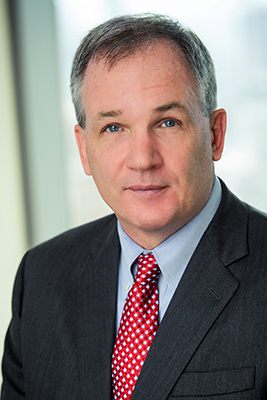June 1, 2013
AMHERST, Mass. — Amherst College has appointed Shirley Tilghman, the president of Princeton University, to its Board of Trustees, while Amherst alumnus Patrick Fitzgerald ’82 was elected to serve on the board by his fellow alumni. Both six-year terms will begin on July 1. Tilghman received an honorary doctorate from Amherst in 2008, and Fitzgerald received an honorary doctorate from Amherst in 2007.
Tilghman, a world-renowned scholar and leader in the field of molecular biology, served on the Princeton faculty for 15 years before being named president in 2001. She famously was asked to step down from the presidential search committee so that she could become a candidate for the job. She announced in September that she would step down from the presidency at the end of the 2012–2013 academic year.
Fitzgerald, who joined the Chicago office of the law firm Skadden, Arps, Slate, Meagher & Flom LLP and Affiliates as partner last year, served as the United States attorney for the Northern District of Illinois from 2001 to 2012. In this capacity, he led numerous high-profile investigations and prosecutions, including the convictions on corruption charges of two successive governors of Illinois—George Ryan and Rod Blagojevich. As a special counsel, Fitzgerald was selected to lead the investigation of leaks in the Valerie Plame matter and tried the case of United States v. Lewis “Scooter” Libby.
“Amherst College is very fortunate that it will soon be benefitting from the wisdom of one of academia’s most visionary leaders and one of the legal profession’s most distinguished practitioners,” said Cullen Murphy ’74, chair of the Amherst College Board of Trustees. “We look forward to, and are grateful for, their service to the college.”

Shirley Tilghman
The first woman to lead Princeton, Tilghman lists among her accomplishments as president the hiring of more female faculty members and overseeing the university’s historic Aspire campaign, which concluded in July 2012 and raised $1.88 billion. She also oversaw a wide-ranging agenda at Princeton, including extensive growth in the role of creative and performing arts on campus, multiple major initiatives in the sciences and engineering, an expansion of the undergraduate student body and the addition of four-year residential colleges.
Tilghman, a native of Canada, received her Honors B.Sc. in chemistry from Queen’s University in Kingston, Ontario, in 1968. After two years of secondary school teaching in Sierra Leone, West Africa, she obtained her Ph.D. in biochemistry from Temple University in Philadelphia. During postdoctoral studies at the National Institutes of Health, she made a number of groundbreaking discoveries while participating in cloning the first mammalian gene and then continued to make scientific breakthroughs as an independent investigator at the Institute for Cancer Research in Philadelphia and an adjunct associate professor of human genetics and biochemistry and biophysics at the University of Pennsylvania.
Tilghman came to Princeton in 1986 as the Howard A. Prior Professor of the Life Sciences. Two years later, she also joined the Howard Hughes Medical Institute as an investigator. In 1998, she took on additional responsibilities as the founding director of Princeton’s multidisciplinary Lewis-Sigler Institute for Integrative Genomics.
A member of the National Research Council’s committee that set the blueprint for the U.S. effort in the Human Genome Project, Tilghman was also one of the founding members of the National Advisory Council of the Human Genome Project for the National Institutes of Health.
She is renowned not only for her pioneering research but for her national leadership on behalf of women in science and for promoting efforts to make the early careers of young scientists as meaningful and productive as possible.

Patrick Fitzgerald ’82
Fitzgerald was born in Brooklyn and grew up in the Flatbush neighborhood. He attended Our Lady Help of Christians Grammar School and Regis High School, a prestigious Jesuit Catholic school in Manhattan. He earned a B.A. degree in economics and mathematics and Phi Beta Kappa membership from Amherst College in 1982 before receiving his J.D. from Harvard Law School in 1985.
After practicing civil law, Fitzgerald was named an assistant U.S. attorney in New York City in 1988. He handled drug-trafficking cases and, in 1993, assisted in the prosecution of Mafia figure John Gambino, a capo in the Gambino crime family. In 1994, Fitzgerald successfully prosecuted Sheikh Omar Abdel Rahman and 11 others charged in the 1993 World Trade Center bombing. In 1996, Fitzgerald became the national security coordinator for the Office of the U.S. Attorney for the Southern District of New York.
There, he served on a team of prosecutors investigating Osama bin Laden. He also served as chief counsel in prosecutions related to the 1998 U.S. embassy bombings in Kenya and Tanzania. Fitzgerald was confirmed as the U.S. attorney for the Northern District of Illinois in 2001.
The Board of Trustees of Amherst College consists of the president of the college and 20 other members: 14 term trustees elected and then appointed by the board and six alumni trustees elected by the alumni of the college. Two trustees will step down from the board on June 15: William E. Ford ’83, who has served on the board since 2001, and Blair H. Taylor ’85, who was elected to the board in 2007.
About Amherst College
Founded in 1821, Amherst is a highly selective, coeducational liberal arts college with 1,800 students from most of the 50 states and more than 30 other countries. Considered one of the nation’s best educational institutions, Amherst awards the B.A. degree in 37 fields of study. Sixty percent of Amherst students receive need-based financial aid.
###